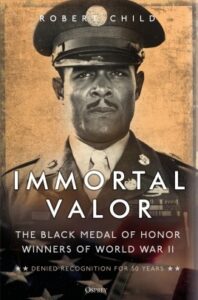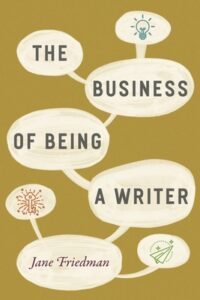Robert Child: Immortal Valor: The Black Medal of Honor Recipients of World War II
May 26, 2022 by David
Filed under Non-Fiction, WritersCast
 Immortal Valor: The Black Medal of Honor Recipients of World War II – Robert Child – Osprey – 9781472852854 – 288 pages – hardcover – $30 – January 11, 2022 – ebook edition available at lower prices
Immortal Valor: The Black Medal of Honor Recipients of World War II – Robert Child – Osprey – 9781472852854 – 288 pages – hardcover – $30 – January 11, 2022 – ebook edition available at lower prices
It is remarkable to realize how few medals of honor were awarded for service during World War II – there were 432 Congressional medals given out of the over sixteen million men and women who served during that four year period during which America fought large scale brutal wars in both the Pacific and European theaters. It is therefore shocking to find out that not a single African American was among the 432 honorees, despite the fact that over one million African Americans served in the then mostly segregated military environment.
Racism remains an American fact of life. But the “progress” made in the modern era probably has muddied our awareness of what our country was like such a short time ago. Robert Child has done an admirable service with this book, documenting the incredible heroism of the seven Black American heroes of World War II who were finally recognized for their efforts – but only after an incredibly long period of time and much work in their behalf.
Child documents the recent historical investigations that have discovered and the stories of extraordinary acts of heroism and valor by the Black soldiers in World War II who were eventually awarded the highest honor our country offers for wartime service. The group of servicemen includes Vernon Baker, Sergeant Reuben Rivers, and Lieutenant Charles Thomas, who led his platoon that captured a strategically important village in Germany in 1944 despite suffering grievous wounds and losing half the men in his unit. The other four who are portrayed sympathetically and thoroughly in this book are Willy James, Jr., John Fox, Edward A. Carter, Jr., and George Watson, heroes all, not only for their valor in the fights they undertook, but for what they did to overcome the deep-seated endemic racism in the military during the time they served their country.
It was not until 1993 that a US Army commission determined that these seven men had been denied our country’s highest award – only because of racial discrimination. And then it was in 1997, more than 50 years after the war that President Clinton finally awarded the Medal of Honor to them, with only one still being living at the time.
Their stories comprise most of this book, as well as some background about the military before, during and after World War II. Sadly, it is almost certain that there are other Black service men and women who might have deserved recognition for their sacrifices and heroism in that war. It was not even until the Obama administration that two World War I heroes were recognized, Sergeant William Shemin, for whom the anti-semitism of the time meant his amazing feats of heroism were almost lost to history, and Sergeant William Henry Johnson, another Black soldier who had been recognized by France with a Croix de Guerre in 1919, but neglected by the United States for far too long.
It was an honor for me to speak with author Robert Child about this terrific and highly emotional book.
Child is a military history writer, director, and author with. Robert has received writing and directing awards including an Emmy® nomination. He lives in Atlanta.
“This is the only comprehensive narrative written about the African American Medal of Honor recipients of WWII to date. Extremely well written, with very little personal background on some of these men to work with, Child manages to bring each of these heroes’ stories to life on a personal level. Child carefully reconstructs each recipient’s life prior to his act of valor, demonstrating the character traits that made each an example of integrity, sacrifice and courage. This is a must-read book about seven black soldiers and their bravery at the highest level and the racial injustice that took over four decades to acknowledge. Well done!” ―Arthur Collins, President, 5th Platoon, the black World War II education and reenactment group
Podcast: Play in new window | Download
Publishing Talks: Interview with Jane Friedman
May 10, 2022 by David
Filed under Ebooks and Digital Publishing, Publishing History, PublishingTalks, The Future
 Publishing Talks started as a series of conversations with book industry professionals and others involved in media and technology, mostly talking about the future of publishing, books, and culture. It was great fun talking with people in the book industry about the evolution of publishing in the context of technology, culture, and economics.
Publishing Talks started as a series of conversations with book industry professionals and others involved in media and technology, mostly talking about the future of publishing, books, and culture. It was great fun talking with people in the book industry about the evolution of publishing in the context of technology, culture, and economics.
Later this series broadened considerably. In the past few years, I’ve talked with a variety of editors, publishers and others who have been innovators and leaders in independent publishing and bookselling in the past and into the present.
These conversations have been inspirational to me. I have had the pleasure of speaking with visionaries and entrepreneurs, editors, publishers and others who have influenced and changed contemporary literature and culture. I’ve also had the opportunity to speak with a number of friends and colleagues in the book business.
I’ve not had occasion to speak with the same person twice during all the years this series has gone on. But I really wanted to speak again with Jane Friedman, whose insights and knowledge I thoroughly respect, and get her sense of the current state of publishing and bookselling, especially as it affects writers and independent publishers. Our last Publishing Talks conversation was in 2015! Much has changed since then, and there was much for us to talk about.
Jane publishes a terrific newsletter I read religiously called The Hot Sheet. Her most recent book is The Business of Being a Writer (University of Chicago Press). Collaborating with The Authors Guild, she wrote The Authors Guild Guide to Self-Publishing. Her website offers a wide range of services and information for writers: “I report on the book publishing industry and help authors understand the business. I’ve been working in book publishing since the 1990s, but my views are not from the 1990s. Amidst rapid change in the industry, writers need honest and unbiased guidance to make the best decisions for their careers. I hope to offer you a signal amidst the noise.”
And I hope this conversation does the same.

Podcast: Play in new window | Download

